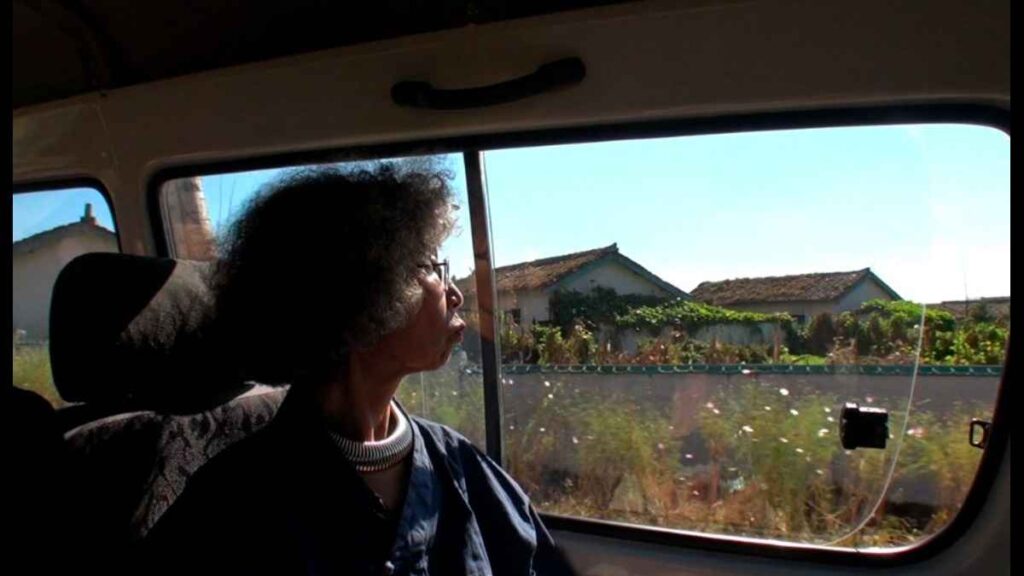Pulitzer Prize Winner Ilyon Woo Shares Craft Lessons from the Late Filmmaker Dai Sil Kim-Gibson
I’ve never encountered an Asian woman—especially one in her eighties—who cussed with as much gusto and frequency as the late filmmaker Dai Sil Kim-Gibson. I can vividly picture her throwing her head back, glass in hand, reveling in the sound of her own profanities, her wild hair bouncing like kinetic iron spirals. She approached cooking with the same passion she brought to her filmmaking and activism. Her bindaetok, or Korean mung bean pancakes, were legendary—served hot and crispy, with a secret ingredient: kimchi juice. (shared By Ilyon Woo)
Dai Sil’s cooking repertoire also included her famous Iowa Fried Chicken, a dish inspired by her husband’s mother but elevated with her own twist. A dash of lemon added a tangy kick that made it unforgettable. Beyond her culinary skills, Dai Sil was an activist, author, and historian who left an indelible mark on those who knew her. From her, I learned two vital lessons that transformed my storytelling and my life.(shared By Ilyon Woo)
These lessons center around the Korean word han, an existential concept of deep sorrow and anguish that is uniquely Korean and defies simple translation. In her book Silence Broken, which recounts the stories of Korean women enslaved by the Japanese during World War II, Dai Sil defines han as “long sorrow and suffering turned inward.”
This suffering is not confined to a single lifetime but accumulates across generations. Han permeates her work, whether in her documentary Sa-I-Gu about the Los Angeles riots, or A Forgotten People, which focuses on Koreans left on the Sakhalin Islands, or Silence Broken. Despite the collective trauma, Dai Sil’s storytelling power lay in her ability to see and portray the individuals behind the suffering. (shared By Ilyon Woo)
The first lesson I learned from Dai Sil came through a story she shared with me. While assisting her and her frequent collaborator, Charles Burnett, on the film version of Silence Broken in Korea, I heard about her early interviews with the “Halmeonis” (grandmothers)—a term Dai Sil used to refer to former “comfort women,” a euphemism she adopted to highlight their humanity. When Dai Sil first approached these women, many had already been interviewed multiple times and had fallen into a pattern of recounting their trauma. Dai Sil found this troubling and asked one Halmeoni about her life before the camps. (shared By Ilyon Woo)
“You want to know about my childhood?” the Halmeoni asked, incredulous. No one had shown interest in her life before the war. Dai Sil’s question allowed the woman to reclaim her identity beyond her trauma, showing the importance of recognizing the full humanity of those we seek to understand.
The Halmeonis were selective about who they shared their stories with. One even demanded a young male production assistant leave, suspecting him of being Japanese, despite Dai Sil’s assurances of his Korean ancestry. Another questioned why Charles Burnett, an American, was directing the project. Dai Sil’s gentle response, “His people have known han, Halmeoni,” bridged the gap between cultures, showing that shared suffering can foster understanding and connection. (shared By Ilyon Woo)
Reflecting on these experiences has profoundly influenced my own storytelling, especially in my latest book, Master Slave Husband Wife, about Ellen and William Craft. Dai Sil’s approach reminded me of the importance of seeing the full lives of the Crafts, beyond their famous escape from slavery. Her phrase, “His people have known han,” provided a framework for understanding the Crafts’ experiences and the legacy of their struggles. (shared By Ilyon Woo)
Another key concept Dai Sil taught me is jung, a complex Korean word often translated as love, affection, or attachment. Jung can exist even in relationships marked by conflict or ambivalence. This concept, like han, has layers of meaning and deeply influenced my understanding of the Crafts’ story. Jung embodies the connections that bound Ellen and William Craft to each other and to their community, giving them the strength to endure and persevere. (shared By Ilyon Woo)
While some purists might argue that han and jung are uniquely Korean and cannot be fully understood by non-Koreans, I believe that these concepts have universal resonance. Just as Dai Sil’s cooking blended her Korean heritage with new influences, her storytelling combined deeply Korean ideas with broader human experiences. Her ability to convey the essence of han and jung in her work has enriched my own storytelling, helping me to capture the depth and complexity of the lives I write about. (shared By Ilyon Woo)
Dai Sil’s legacy lives on in the stories she told and in the lessons she imparted. Her fierce spirit, her passionate cooking, and her profound understanding of human suffering and connection continue to inspire me. As I imagine her, glass raised in a toast, I am reminded of the power of words and the importance of seeing the whole person behind every story. (shared By Ilyon Woo)
Also Read: Iran President Dies at age of 63 in Tragic Helicopter Crash – American Report


Pingback: 16 Highest Paying and Exciting Jobs in the USA - American Report